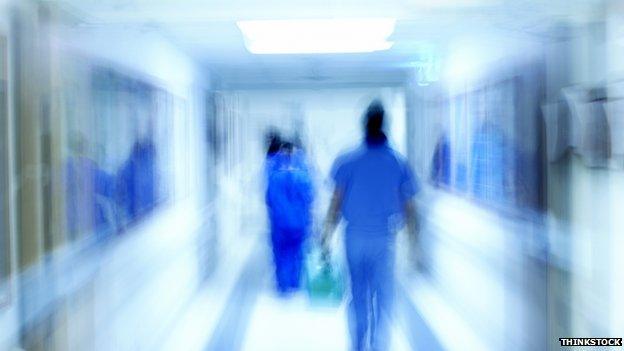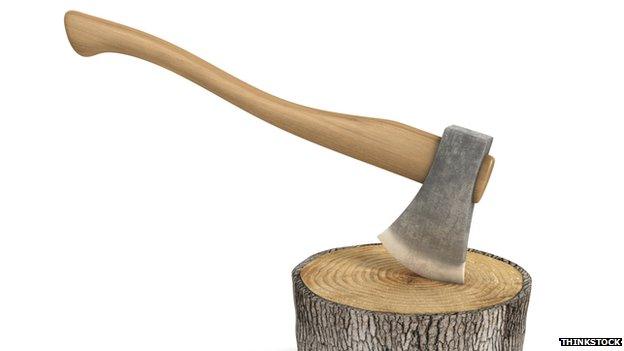Back to the future squeeze
- Published

So it's back to austerity. The battling over future projections for an independent Scotland's budget can be binned.
It's time to focus on the budgets which Holyrood will have, rather than the ones it might have had.
And that day of reckoning, to coin a phrase, is coming soon. John Swinney, the Finance Secretary, has been busy campaigning of late. But back at St Andrew's House, at the top of his "to do" list are the final stages of putting together a draft budget for next financial year.
It doesn't look pretty. Amid the noise of the final days of referendum campaigning, the leak of NHS management planning was a reminder that reality is about to bite.
It showed a gap of up to £450m in the NHS budget over the next two years.
And it showed the health service's accountants are unhappy that political commitments are making it very difficult to get the reform to which MSPs are committed.
Slogans
Politically, for instance, it's important not to close local hospitals. But in efficient management terms, as well as clinical developments, it's very important to do so.
We've heard much about whether the NHS would be better protected within the UK or outside it. And we'll hear a lot more about protecting the NHS at this week's Labour conference.
But inside the NHS, there's frustration that the slogans don't begin to address the challenge.
In England, it's reckoned there will be a £30bn spending gap by the start of next decade. That's two and a half times the size of Scotland's health budget.
England may face higher population increases, but otherwise, the pressures are similar in Scotland. And during the independence debate, the more reliable projections of Scotland's finances pointed to public spending being squeezed at least as hard as the Treasury is already doing.
Austerity might have been rebranded, but it wasn't going to go away.
Honest politicians
The King's Fund, which analyses health policy from London, recently called for next year's Westminster election to be honest about the challenge:
"The next government will arrive in office with the NHS facing financial meltdown and social care in crisis. Looking further ahead, pressures to spend more will grow as the costs of treatment rise, public expectations increase and the population continues to age."

It concluded: "It is essential that politicians are honest about the scale of these pressures and engage in a public debate about how to address them."
Last month, the head of the National Institute for Health and Care Excellence - the agency that approves (or doesn't) drugs for NHS use throughout Britain - also called for more honesty from politicians.
With very pricey new medicines becoming available, he warned the NHS is having to exercise choices to ensure resources are allocated fairly.
"We shouldn't mislead ourselves into thinking there is some world we will reach where everything that could conceivably make a difference to us, whatever its price, is going to be available," Sir Andrew Dillon told the Financial Times.
Protected
This is despite the NHS being one public service that's had its budget protected from cuts. That means funds rising in line with general inflation, but they've failed to meet the rising pressure on NHS costs of around 4% per year - from a growing population, more older people needing services, more expensive treatments and procedures, along with higher expectations of care quality.
And if the NHS in Scotland continues to get at least some protection for its £12bn budget, it means that other services have to take more of the pain from Holyrood's £26bn annual spend.
The scale of resource spending (the non-capital bit of government budgets) means that non-NHS spend is going to fall by 25% over these austerity years. The most recent analysis from the Centre for Public Policy for Regions, is that £2bn has been cut (at 2012 prices), and that another £2.8bn is yet to be cut.
That accelerated cut is because the resource budget, to keep public services running, is set to face its steepest cuts in the next three years.
Capital spending has had the deep cuts up until now, and it is now increasing a bit, but current spending is falling by 1.8% this year, 1.9% next year, and it's projected to fall 3.5% the year after and 3.9% in 2017-18.
Plugging the gap
Public service managers have kept quiet while Scottish ministers wanted to shut down unhelpful news in recent months. But the bean-counters have spent that time planning on deep cuts for next year.
So now that it's clear that independence isn't going to provide an escape from budget pressures, John Swinney may continue to squeeze more out of efficiency, or he could contemplate two options, neither of them easy.
One would be to use the new tax powers, already enacted which will become available from 2016. Raising income tax by 1p in the pound could deliver £400-£450m, according to the Institute of Fiscal Studies, and that could feed through to a 4% rise in the NHS Scotland budget (thus plugging the gap managers have identified).

His other option is to dust down the Independent Budget Review carried out by Crawford Beveridge and published in 2010. It was taken over by constitutional campaigning with its rosily optimistic budget projections.
Some of the recommendations have already been put in place: amalgamating eight police forces and colleges, for instance. The IBR also suggested mergers within the 32 local authorities and of universities.
It suggested a change to Scottish Water's public ownership, though not full privatisation. It questioned whether the health service should continue to have its budget protected at the expense of other services.
Targeting
And it challenged the provision of free universal services, including concessionary fares, prescription and eye test charges, free care for the elderly and student tuition fees.
They're "commendable, but may not be affordable," said the Beveridge Review. "A debate needs to be had on whether those who can afford to pay might be invited to do so, thus allowing better targeting of those in most need".
Such a debate has been ruled out while the independence case has been fought. And free student tuition was safe, according to Alex Salmond, "until the rocks melt in the sun".
Well, Mr Salmond is leaving office. The independence debate raised expectations that social justice should be more of a priority in Scotland. And those budget pressures aren't going away.
So it's one big area where we wait to see if the new SNP leader and first minister is going to change again and possibly change direction.